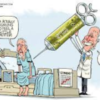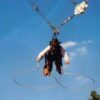Russian government troops withdrew from the streets of Moscow and people flocked to parks and cafes Sunday following
![]()
Russian government troops withdrew from the streets of Moscow and people flocked to parks and cafes Sunday following a short-lived revolt by mercenary forces that weakened President Vladimir Putin and raised questions about his ability to wage war in Ukraine.
The march on the capital by Wagner troops led by Yevgeny Prigozhin and the late-night deal that eventually halted it severely dented Putin’s reputation as a leader who is willing to ruthlessly punish anyone who challenges his authority. That may open the door for others who are unhappy with Putin’s two-decade grip on power, especially after his ill-fated invasion of Ukraine.
Under terms of the agreement, Prigozhin will go into exile in Belarus but will not face prosecution and his forces won’t either. Neither Putin nor Prigozhin has been heard from since the deal, reportedly brokered by Belarussian President Aleksander Lukashenko, was announced Saturday night.
U.S. Secretary of State Antony Blinken described the weekend’s events as “extraordinary,” recalling that 16 months ago Putin appeared poised to seize the capital of Ukraine and now he has had to defend Moscow from forces led by his onetime protege.
“I think we’ve seen more cracks emerge in the Russian façade,” Blinken said on NBC’s Meet the Press. “It is too soon to tell exactly where they go and when they get there, but certainly we have all sorts of new questions that Putin is going to have to address in the weeks and months ahead.”
ADVERTISEMENT
It was not yet clear what the fissures opened by the 24-hour rebellion would mean for that war. But it resulted in some of the best forces fighting for Russia in Ukraine being pulled from the battlefield: Prigozhin’s own Wagner troops and Chechen ones sent to stop them.
But Ukrainians hoped and some analysts suggested that the Russian infighting could create opportunities for their army, which is in the early stages of a counteroffensive to take back territory seized by Russian forces.
“These events will have been of great comfort to the Ukrainian government and the military,” said Ben Barry, senior fellow for land warfare at the International Institute for Strategic Studies.
Another question is what will happen to Prigozhin-owned Wagner, in general. The military contractor has deployed forces in several countries where they are believed to fight for Russian interests.
Under terms of the agreement that stopped Prigozhin’s advance, Wagner troops who didn’t back the revolt will be offered contracts directly with the Russian military, putting them under the control of the military brass that Prigozhin was trying to oust.
The deal appears to be



















